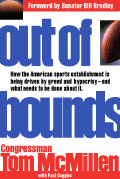End the Chattel System for Student-Athletes
Opinion
by Tom McMillen
Fairness Demands That College Athletes Be Allowed Adequate Representation in Pro Negotiations
Last week, longtime University of Maryland basketball coach Gary Williams announced his retirement, and very quickly Maryland announced that Texas A&M Coach Mark Turgeon will replace him. No one doubts that during contract negotiations, Turgeon had lawyers advising and representing him.
Coincidentally, just days before Mr. Williams made his announcement, Jordan Williams, Maryland’s star sophomore basketball player, lost his eligibility to play college basketball. What crime earned this penalty? He signed with an agent to represent him in upcoming NBA negotiations, a violation of NCAA rules. Once an athlete hires an agent, there’s no going back — even if he’s only exploring his options, even if he doesn’t get drafted. He’s forever ineligible to play college basketball.
Why is counsel fine for the coach but wrong for the player?
Though most of us consider access to legal advice a right, the NCAA prohibits student-athletes from meaningful legal representation. They can talk to a lawyer, but that lawyer or agent is not allowed to negotiate for them. The NCAA argues it is protecting athletes from unscrupulous agents. The real motives are probably less admirable. With access to competent counsel, many players would try to head to the NBA earlier. The quality of NCAA competition — and the income from lucrative TV contracts — might drop off. But perhaps the key reason for the sanction is that allowing student-athletes counsel would demolish the argument that there’s no employer-employee relationship with athletes on college campuses. If the NCAA loses that claim, athletes could have representation every step of the way: from signing a letter of intent in high school to negotiating appropriate compensation. If players ever get that right, the whole NCAA chattel system will come crashing down.
Student-athletes should be able to hire representation and not face ineligibility until they actually sign a professional contract. They need advice during negotiations — and if the NBA decides not to draft them, they shouldn’t be banned from returning to their team. Right now, the threat of ineligibility keeps them from even investigating their opportunities. Do these kinds of constraints restrict any other profession?
When I was a student at Maryland, I was a first-round draft pick in the NBA but chose instead to go to Oxford on a Rhodes Scholarship. While I was at Oxford, I traveled back and forth to Italy to play professional basketball for a team in Bologna. Dean Smith, the coach of the Olympic team in 1976, invited me to play in those games, though professional athletes were prohibited from playing. But through the convoluted policies of the International Olympics Committee, I was still considered an amateur, even though I had an agent and was getting paid. Only players actually playing in the US were required to be amateurs. Eventually, this double standard ended, and since 1989 professional players from the U.S. have competed in the Olympics.
The NCAA needs similarly to acknowledge the injustice of its rules. Colleges profit from the skills of student-athletes — yet treat them like chattel. The NCAA should encourage athletes to seek counsel, not ban it. Allow student-athletes to hire agents to negotiate for them. Have colleges take responsibility in preparing elite athletes to become professional players; let them get advice on avoiding bad agents, managing money, understanding contract law. For success in the future, gifted student-athletes need this information — and denying access to it is just plain wrong.
To be fair, the NCAA does work to maintain the student performance of athletes, but that’s not enough. Eventually, a court case will end the NCAA’s ability to enforce its arbitrary rules. But for now, NCAA policies highlight the inequity. Recently, the NCAA (a tax-exempt nonprofit, by the way) signed a $10.8 billion TV contract, and at least 25 Division I college basketball coaches earn more than $1 million per year. As long as the NCAA and coaches get rich off their services, student-athletes have the right to advice and representation. The current lopsided system is wrong — and the NCAA claim that the education student-athletes receive is a fair exchange for their services is just window dressing.
If coaches can bargain for their services and compensation, how can those same rights be denied to their players?
http://articles.baltimoresun.com/2011-05-13/news/bs-ed-basketball-20110513_1_student-athletes-chattel-system-negotiations








